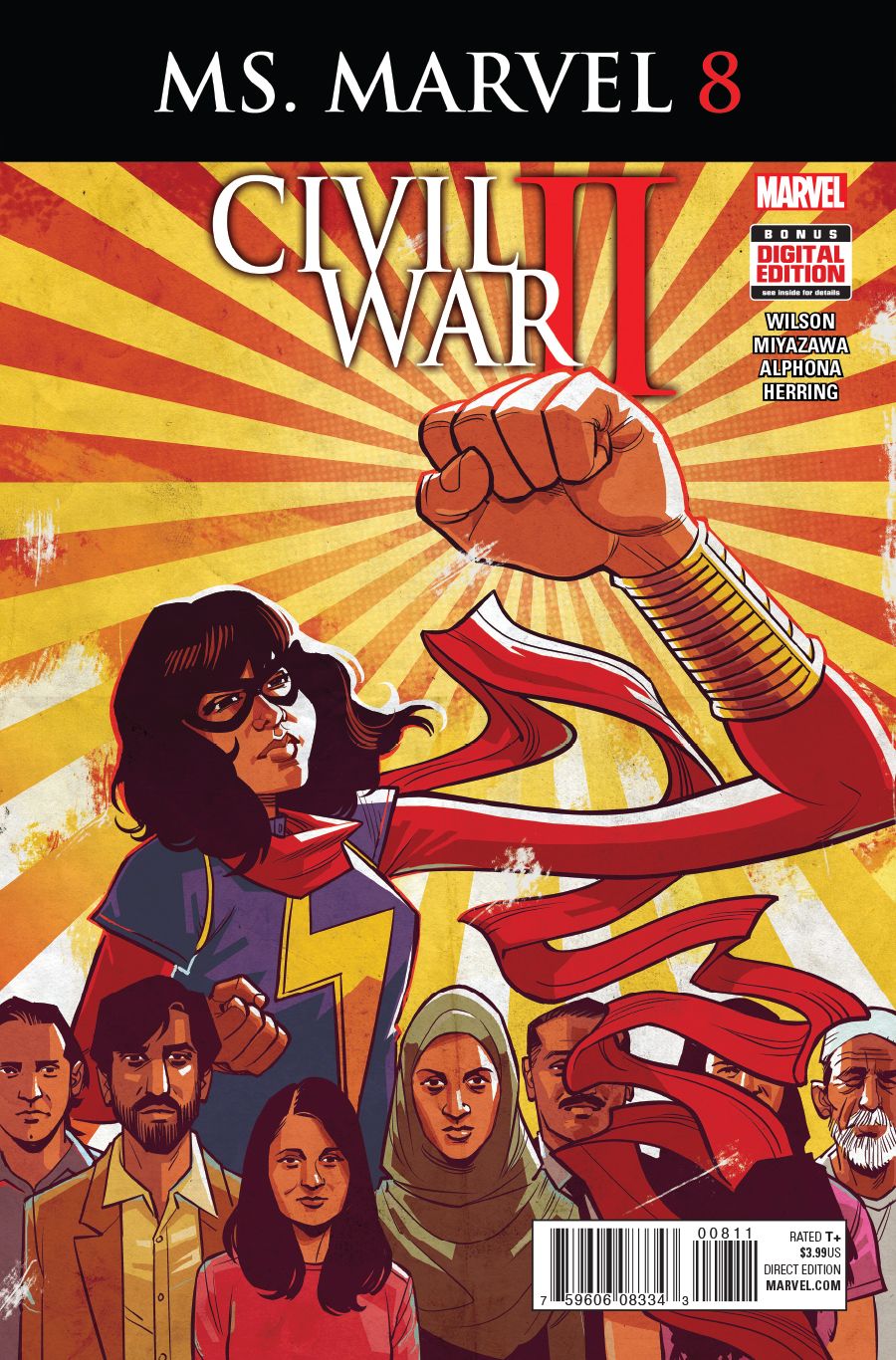In G. Willow Wilson, Takeshi Miyazawa and Adrian Alphona's "Ms. Marvel" #8, Kamala chooses sides quickly in "Civil War II," but it's not until she's leading a brand new team of Carol Cadets that she realizes the right choice may not be as clear-cut as it seems. Unfortunately, though, the event takes precious panel space away from "Ms. Marvel's" signature humor in this issue, which ultimately hampers the title's distinct voice.
The issue begins with an unexpected and lovely prologue. It's a flashback set in Bombay in 1947, narrated by Kamala's grandmother, Aisha. Her mingled fear and hope feels vividly specific to one family and one place, yet her feelings are also profoundly universal. Alphona's backgrounds capture the tumult of the city, and his eloquent body language is a thoughtful counterpoint to Wilson's poetic rhythm and diction in the word balloons and captions, particularly when Kareem's father quotes John Keats. Ian Herring and Irma Kniivila's colors are exceptional as well. The bright crimson of Aisha's headscarf guides the reader's eye to her, while the wine and plum tones are an unusual and strangely perfect choice for Alphona's desolate, yet cozy landscape, which is interrupted only the shape of a white star and the huddle of a family. His page composition visually reinforces Wilson's point about how "Even in the midst of civil war...something, however small, remains."
When the story returns to Kamala's life and the new Civil War, the plotting becomes much more predictable, and it's no great surprise whose side Kamala chooses. "Ms. Marvel" #8 is dialogue-heavy, but the pages of talking heads go by quickly due to Wilson's ear for dialogue and Miyazawa's facial expressions. Kamala comes off as a more complex character than before, mostly because she missteps due to her loyalty and some understandable vanity. Kamala picks a side too quickly, almost reflexively, based on long-standing loyalty; her enthusiasm makes her look young and naïve, which is more realistic than not. Wilson is careful to balance it out, though. Even if Kamala doesn't think it over sufficiently before saying "yes," her point about racial profiling is a good one. Later on, a conversation with her sister-in-law Tyesha gives Kamala more to chew on, which also comes off as realistic.
"Ms. Marvel" #8 makes some blunders with criminal law. An attempted act of violence like Hijink's is still a crime that can be charged accordingly, as was the theft of a tank. The penalties for attempts are often as stiff as those of a completed crime (attempted murder vs. murder is a notable exception), as long as intent can be proven beyond a reasonable doubt, so the examples Wilson chooses fail to make the moral struggle of "Civil War II" -- the paradox of free will -- as crystal clear as it could be.
Under Captain Marvel's way of thinking, one doesn't have to be guilty of an attempt or even "thoughtcrime" -- and it's actually even worse than that. The point is that Ulysses' visions are treated like gospel; if Ulysses has a vision, Captain Marvel will take action, no matter if the alleged future perpetrator has plans or has taken steps. The result is that the examples of crime in "Ms. Marvel" #8 pander too much to Carol's way of thinking, which is also a reminder of one of Wilson's weaknesses. In "Ms. Marvel," moral issues have often been handled in a tidy and simplistic manner. While this is appropriate to the family-friendly nature of the title, it's also a handicap when a big crossover event chooses to tackle Fate vs. Free Will.
Though the other Carol Cadets members are unfortunately pretty flat so far, the last page cliffhanger makes the title feel more personal again. It's smart of Miyazawa to heighten the background detail that reinforces the humanity of the newest "future-criminal" and his connection to Kamala. While the next issue will probably push the moral debate a little further, the story arc feels weaker than most of the non-event-related issues that preceded it. In "Ms. Marvel" #8, "Civil War II" takes panel time away from the personal relationships and humor that make "Ms. Marvel" distinctive.

